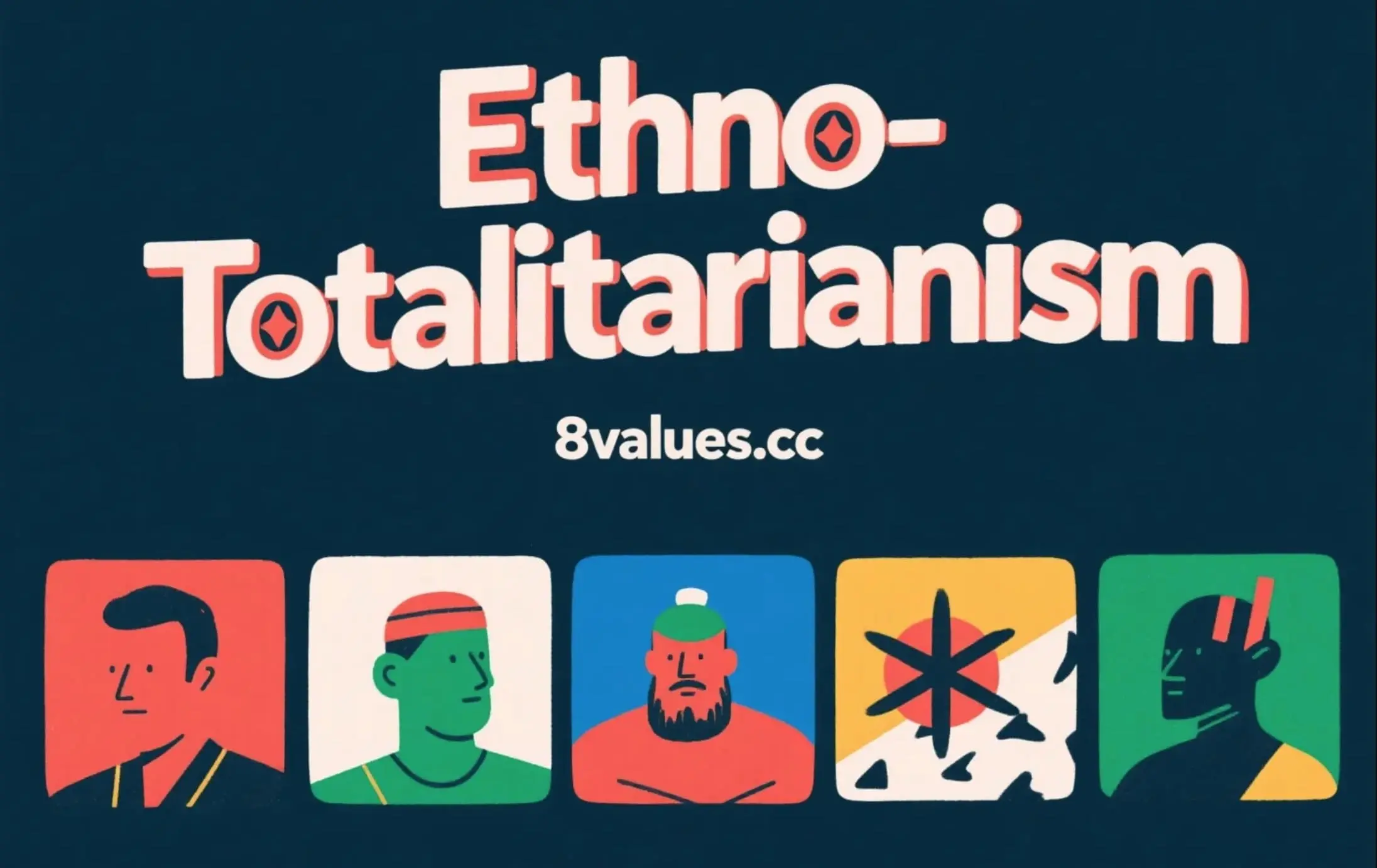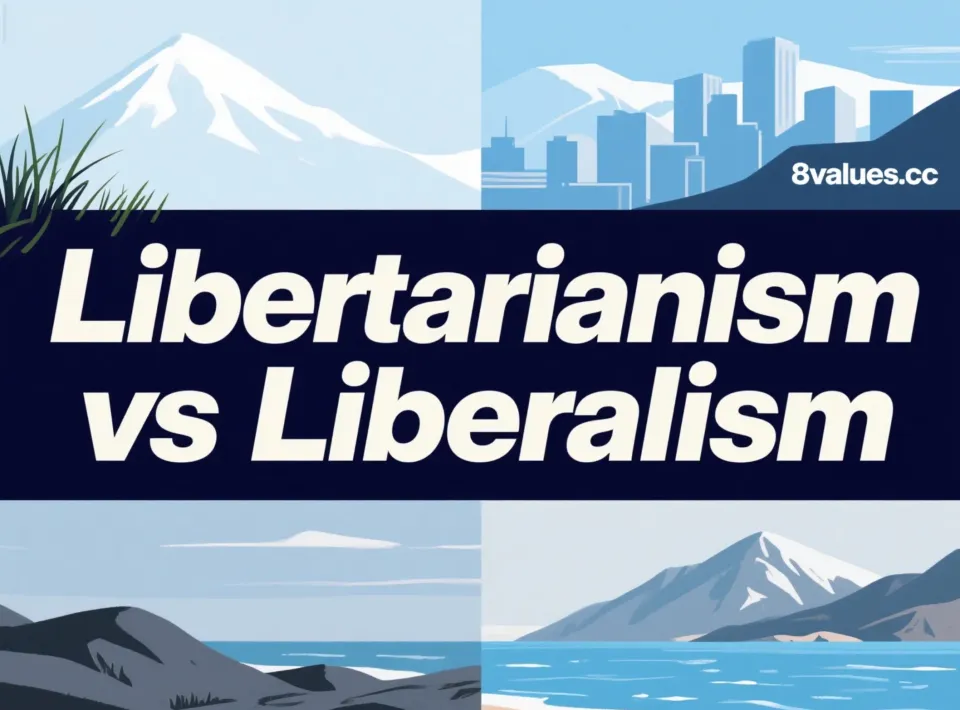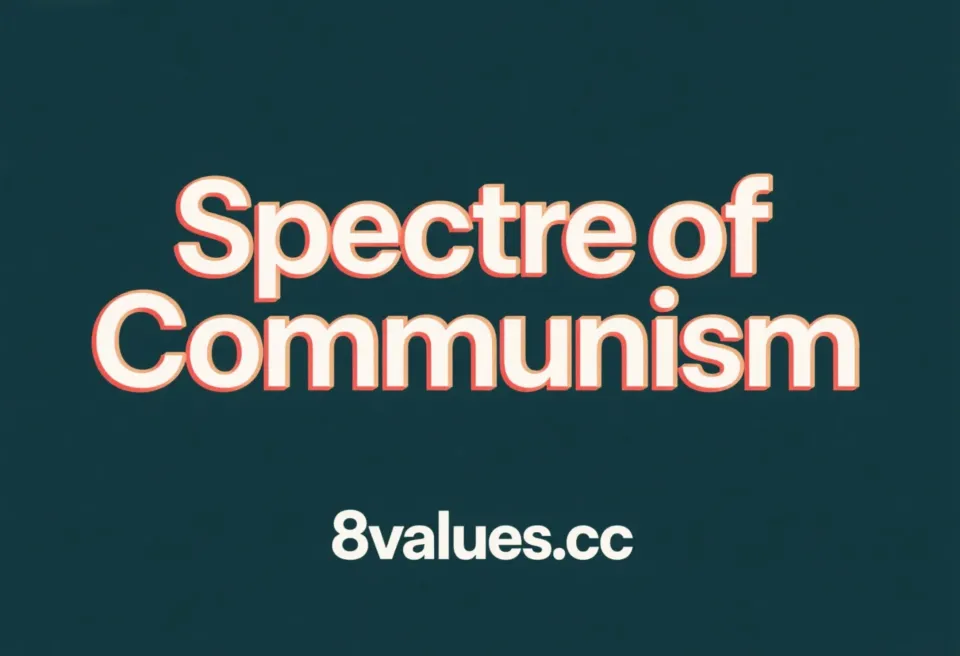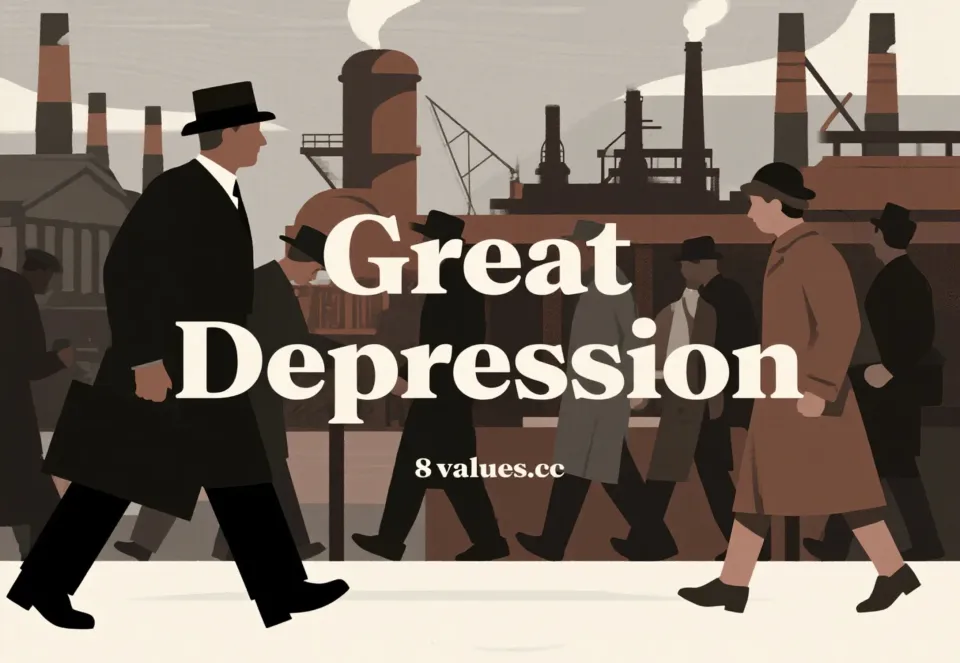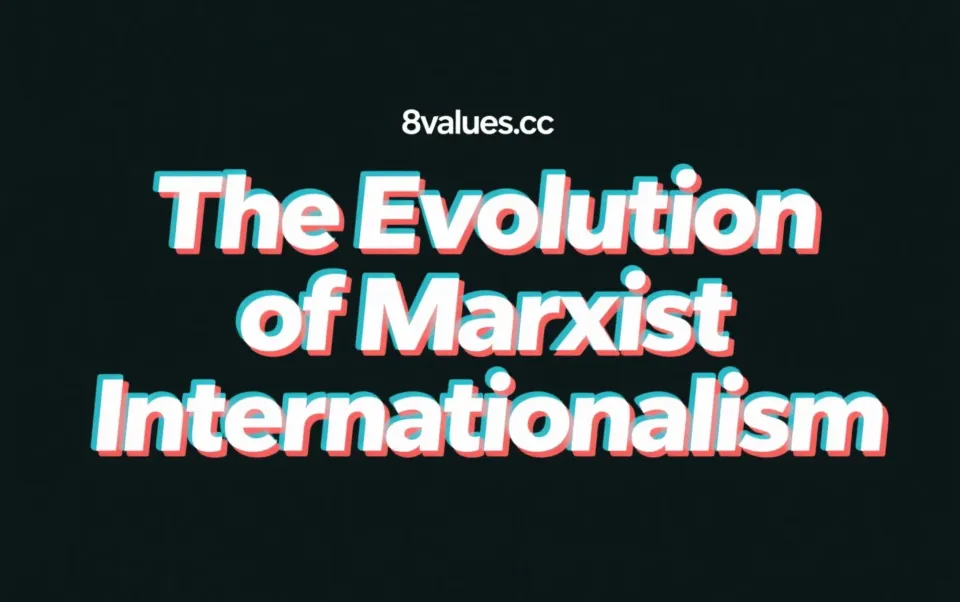एथनो-टोटलिटेरिज्म | राजनीतिक परीक्षणों में वैचारिक विचारधारा की 8values व्याख्या
"राष्ट्रीय अधिनायकवाद" की जटिल और खतरनाक राजनीतिक विचारधारा की गहराई से व्याख्या करें, चरम राष्ट्रवाद और अधिनायकवादी शासन के साथ इसके संयोजन को समझें, इसकी मुख्य विशेषताओं, ऐतिहासिक अभिव्यक्तियों, मानवाधिकारों के उल्लंघन और संबंधित अवधारणाओं से मतभेदों का पता लगाएं, और इस राजनीतिक घटना को पूरी तरह से समझने में मदद करें जो मानव नागरिक के लिए एक गंभीर चुनौती है।
राजनीतिक रुख की प्रवृत्ति के 8 मूल्यों में वैचारिक परीक्षण , "एथनो-टोटेलिटेरियनवाद" एक राजनीतिक विचारधारा और प्रभुत्व मॉडल है जो चरम राष्ट्रवाद और अधिनायकवाद की मुख्य विशेषताओं को जोड़ती है। यह एक स्वतंत्र वैचारिक वर्गीकरण नहीं है, बल्कि दो खतरनाक राजनीतिक लॉजिक्स का संयोजन है। इसका सार राष्ट्रीय पहचान की विशिष्टता को मजबूत करना है, समाज, अर्थव्यवस्था, संस्कृति और यहां तक कि व्यक्तिगत जीवन पर एक व्यापक नियंत्रण बनाना है, और अंततः राज्य शक्ति पर विशिष्ट जातीय समूहों का एकाधिकार प्राप्त करना और सभी विषम बलों को दबाना है। इस अवधारणा ने 20 वीं शताब्दी के इतिहास में विनाशकारी परिणाम दिए और अभी भी वैश्विक राष्ट्रीय संघर्षों और मानवाधिकारों के संकटों के महत्वपूर्ण कारणों में से एक है।
राष्ट्रीय अधिनायकवाद की मुख्य रचना: चरम राष्ट्रवाद और अधिनायकवादी नियम का संयोजन
राष्ट्रीय अधिनायकवाद का सार "राष्ट्रीय" को अधिनायकवादी शासन की वैधता के आधार के रूप में "राष्ट्रीय" लेने में निहित है, और एक ही समय में, चरम राष्ट्रीय लक्ष्यों को बढ़ावा देने के लिए अधिनायकवादी साधनों का उपयोग करते हुए, दोनों एक दूसरे का समर्थन करते हैं और अविभाज्य हैं।
चरम राष्ट्रवाद: विचारधारा की नींव
चरम राष्ट्रवाद राष्ट्रीय अधिनायकवाद का वैचारिक आधार है। यह सामान्य राष्ट्रवाद से अलग है जो "राष्ट्रीय संस्कृति को बनाए रखता है और राष्ट्रीय समानता के लिए प्रयास करता है" और मजबूत विशिष्टता, श्रेष्ठता और विस्तार है।
- राष्ट्रीय श्रेष्ठता सिद्धांत : दावा करता है कि एक विशिष्ट जातीय समूह (आमतौर पर जातीय समूह जिसके लिए सत्तारूढ़ समूह है) में संस्कृति, रक्त, इतिहास, या "सभ्यता के स्तर" में "प्राकृतिक श्रेष्ठता" है और "देश का कोर/सिंगल मास्टर" है, जबकि अन्य जातीय समूह (चाहे जातीय अल्पसंख्यक, आप्रवासी या "हेटरोजेनियस सांस्कृतिक समूह") को "आउटसिडेंट", ",", ",", ",", ",", "भी", " यह विचार जातीय अल्पसंख्यकों को "सामाजिक रिक्त" के रूप में मानता है, और इसके लंबे इतिहास, सांस्कृतिक योगदान और अद्वितीय अस्तित्व को पूरी तरह से नजरअंदाज और अस्वीकार किया जा सकता है।
- जातीय विशिष्टता : देश के अस्तित्व की कुंजी के रूप में "राष्ट्रीय पवित्रता" का सम्मान करें, सभी "गैर-राष्ट्रीय" संस्कृति, भाषा, धर्म या पहचान की पहचान को बाहर करते हैं, और यहां तक कि कानूनों और नीतियों के माध्यम से विभिन्न जातीय समूहों के शिक्षा, रोजगार और निवास अधिकारों को प्रतिबंधित करते हैं। चरम मामलों में, यह "जातीय सफाई" जैसे बड़े पैमाने पर उत्पीड़न को ट्रिगर करेगा।
- पूर्ण राष्ट्रीय लक्ष्य : "राष्ट्रीय हितों" (जैसे कि क्षेत्रीय विस्तार, राष्ट्रीय "एकीकरण", और "राष्ट्रीय देशद्रोहियों" का उन्मूलन) को मानव अधिकारों, कानून के शासन, अंतर्राष्ट्रीय नियमों और यहां तक कि युद्ध और हिंसा के माध्यम से लक्ष्यों को प्राप्त करने सहित, "राष्ट्रीय देशद्रोहियों" का उन्मूलन)।
- बदला लेने और पीड़ित कथा : यह अक्सर प्रचार करता है कि राष्ट्र को इतिहास में अन्याय और अपमान का सामना करना पड़ा है और एक शक्तिशाली शासन के माध्यम से "बदला" या "पुनरुद्धार" करने की आवश्यकता है।
- काल्पनिक बाहरी खतरे और आंतरिक दुश्मन : "राष्ट्रीय संकट की भावना" बनाकर, बाहरी या "आंतरिक दुश्मनों" (जैसे जातीय अल्पसंख्यकों, वामपंथी लोगों, आदि) पर राष्ट्र की आंतरिक समस्याओं को दोषी ठहराता है, जबकि लोगों के शासन के लिए लोगों के समर्थन को इकट्ठा करने के लिए, जबकि असहमति को दबाने के लिए बहाना ढूंढना।
संबंधित रीडिंग: परिभाषा और राष्ट्रवाद की प्रकार
अधिनायकवादी नियम: कुल नियंत्रण का एक साधन
अधिनायकवाद शासन को प्राप्त करने के लिए राष्ट्रीय अधिनायकवाद का तरीका है। यह "अधिनायकवाद" से अलग है जो केवल राजनीतिक शक्ति को नियंत्रित करता है और सामाजिक जीवन के लिए एक निश्चित स्थान रखता है, और समाज के सभी क्षेत्रों के पूर्ण वर्चस्व का पीछा करता है।
- पावर एकाधिकार और व्यक्तिगत/समूह तानाशाही : राज्य शक्ति एक एकल नेता, राजनीतिक दल या राष्ट्रीय अभिजात वर्ग समूह में अत्यधिक केंद्रित है, और कोई वास्तविक विपक्षी पार्टी, स्वतंत्र न्यायिक या विकेंद्रीकृत चेक और संतुलन नहीं है। सत्तारूढ़ समूह खुद को "राष्ट्रीय प्रवक्ता" के रूप में मानता है और "राष्ट्रीय इच्छा" के साथ अपनी इच्छा के अनुसार है।
- वैचारिक स्वदेशीकरण और वैचारिक नियंत्रण : मीडिया, शिक्षा और सांस्कृतिक संस्थानों का एकाधिकार करके, हम किसी भी संदेह या असंतोष को दबाने के लिए "राष्ट्रीय श्रेष्ठता सिद्धांत" और "राष्ट्रीय संकट सिद्धांत" जैसे मुख्य विचारों को जबरन लागू करेंगे। उदाहरण के लिए, गैर-राष्ट्रीयों के ऐतिहासिक शोध को निषिद्ध किया गया है, विभिन्न आवाज़ों के प्रसार के लिए चैनल अवरुद्ध हैं, और यहां तक कि लोगों को "राष्ट्रीय-सरकार" के समुदाय में "ब्रेनवाशिंग प्रचार" के माध्यम से बाध्य करते हैं।
- सामाजिक घुसपैठ और निगरानी : परिवार, काम और सोशल नेटवर्किंग जैसे निजी क्षेत्रों में प्रवेश करने के लिए एक सख्त निगरानी प्रणाली (जैसे गुप्त पुलिस और पड़ोस व्हिसलब्लोअर प्रणाली) की स्थापना करें। व्यक्तियों को "राष्ट्रीय शासन" के लिए पूरी तरह से वफादार होना आवश्यक है। किसी भी "अव्यवस्थित" व्यवहार (जैसे विभिन्न जातीय भाषाओं का उपयोग और विभिन्न सांस्कृतिक रीति -रिवाजों के संरक्षण) को "राष्ट्र के विश्वासघात" के रूप में माना जा सकता है और दंडित किया जा सकता है।
- अर्थव्यवस्था और संसाधनों का व्यापक नियंत्रण : राज्य (या सत्तारूढ़ समूह) सीधे मुख्य आर्थिक संसाधनों (भूमि, उद्योग, ऊर्जा) को नियंत्रित करता है, और "राष्ट्रीय पहचान" के अनुसार संसाधनों को आवंटित करता है - जातीय समूह प्राथमिकता रोजगार और कल्याणकारी प्राथमिकता का आनंद लेता है, जबकि विषम समूहों को संसाधन आवंटन प्रणाली से बाहर रखा जाता है, जो "जातीय स्तरीकरण" आर्थिक संरचना का निर्माण करता है।
- हिंसा और आतंक का शासन : गुप्त पुलिस और श्रम शिविरों जैसे हिंसक मशीनों के माध्यम से असंतोष को दबाएं। हन्ना अरेंड्ट ने बताया कि आतंक का अधिनायकवादी शासन न केवल विपक्ष को दबाने का एक साधन है, बल्कि इसके शासन का सार भी है, जिसका उद्देश्य मनुष्यों को नियंत्रित करना और भीतर से डराना और यहां तक कि पूरी तरह से मानव प्रकृति को नष्ट करना है। यह "कुल आतंक" मानव व्यक्तिगत चेतना और सहजता को समाप्त करके ऐतिहासिक या प्राकृतिक आंदोलन के पाठ्यक्रम को तेज करता है।
- एकाधिकार मीडिया और प्रचार : व्यापक प्रचार और सख्त सेंसरशिप के माध्यम से जनमत को नियंत्रित करें और नागरिकों की मान्यताओं को आकार दें।
- लीडर पूजा : आमतौर पर, यह एक "स्ट्रॉन्गमैन" लीडर की छवि बनाता है, इसे राष्ट्र या देश के प्रतीक और उद्धारकर्ता के रूप में मानता है, और लोगों के प्रति पूर्ण वफादारी और आज्ञाकारिता की आवश्यकता होती है।
संबंधित रीडिंग: विस्तृत विशेषताओं और अधिनायकवाद की विकास
राष्ट्रीय अधिनायकवाद की प्रमुख विशेषताओं की पहचान करें
राष्ट्रीय अधिनायकवाद के प्रमुख मॉडल में आमतौर पर निम्नलिखित पहचान योग्य विशेषताएं होती हैं, जो एक दूसरे को बंद-लूप नियंत्रण प्रणाली बनाने के लिए सुदृढ़ करती हैं।
- "जातीय पहचान" एकमात्र कानूनी टैग बन जाती है : राष्ट्रीय कानून या नीतियां "जातीय स्वामित्व" को नागरिक अधिकारों को विभाजित करने के लिए मुख्य मानक के रूप में मानती हैं। उदाहरण के लिए, केवल राष्ट्र के सदस्य सार्वजनिक कार्यालय आयोजित कर सकते हैं, सेना में शामिल हो सकते हैं, और राजनीतिक निर्णय लेने में भाग ले सकते हैं; राष्ट्र के सदस्य अपने देश में पैदा होने पर भी पूर्ण नागरिकता प्राप्त नहीं कर सकते।
- "बाहरी खतरे" और "आंतरिक दुश्मन" की दोहरी कथा : शासन ने लंबे समय से अतिरंजित किया है कि "राष्ट्र बाहरी घेराबंदी का सामना करता है" (जैसे कि "अपने स्वयं के राष्ट्र के विकास को दबाने वाला") और "ऐसे देशों के साथ, जो कि देशों के साथ सहयोग करते हैं, जो कि विदेशी समानता का समर्थन करते हैं)," मतभेद।
- संस्कृति और इतिहास का "एकाधिकार पुनर्निर्माण" : जबरन ऐतिहासिक आख्यानों को संशोधित करते हैं, राष्ट्र को "इतिहास के एकमात्र निर्माता" के रूप में आकार देते हैं, और विदेशी राष्ट्रों के ऐतिहासिक योगदान को नीचा दिखाते हैं या बदनाम करते हैं। उसी समय, हमें अपने राष्ट्र की भाषा, धर्म और रीति -रिवाजों को बढ़ावा देना चाहिए और विदेशी राष्ट्रों की सांस्कृतिक अभिव्यक्ति पर प्रतिबंध लगाना चाहिए।
- हिंसक मशीन का "राष्ट्रीयकरण" : सैन्य, पुलिस और न्यायिक प्रणाली के मुख्य पदों का एकाधिकार राष्ट्र के सदस्यों द्वारा किया जाता है। हिंसक मशीन का प्राथमिक कार्य सभी नागरिकों के अधिकारों की रक्षा करने के बजाय "राष्ट्रीय शासन की स्थिरता को बनाए रखना" है। एलियंस के खिलाफ विरोध या प्रतिरोध अक्सर क्रूर दमन होते हैं और कानून के अधीन नहीं होते हैं।
- बंदता और बाहरी अलगाव : शासन राष्ट्रीय सीमाओं को बंद कर देता है और विदेशी आदान -प्रदान को प्रतिबंधित करता है। एक ओर, यह बाहर से "विषम विचारों" की घुसपैठ को रोकता है, और दूसरी ओर, यह अंतर्राष्ट्रीय समुदाय को इसके भीतर राष्ट्रीय उत्पीड़न पर ध्यान देने से बचता है, और "राष्ट्रीय समुदाय" की बंदता को बनाए रखता है।
ऐतिहासिक मामले और राष्ट्रीय अधिनायकवाद के आधुनिक अभिव्यक्तियाँ
20 वीं शताब्दी में राष्ट्रीय अधिनायकवाद सबसे चरम था, जिससे दुनिया के लिए बड़ी आपदाएँ हुईं।
इतिहास में विशिष्ट मामला विश्लेषण
- नाजी जर्मनी (1933-1945) : कोर के रूप में "आर्यन नेशनल सुपीरियरिटी थ्योरी" के साथ, यहूदियों, जिप्सियों, स्लाव आदि को "हीन राष्ट्रों" के रूप में परिभाषित किया गया था, और रंगभेद और जबरन नसबंदी को अधिनायकवादी प्रणाली के माध्यम से बढ़ावा दिया गया था, जो अंततः "होलोकॉस्ट" के लिए नेतृत्व किया गया था। हिटलर के नेतृत्व में नाजी पार्टी ने जर्मनिक राष्ट्र को "प्रीमियम राष्ट्र" माना, "उत्तरजीविता स्थान" सिद्धांत के नाम पर पूर्वी यूरोप पर हमला किया, अधिनायकवादी शासन, जातीय सफाई और बाहरी विस्तार के माध्यम से तथाकथित "राष्ट्रीय कायाकल्प" हासिल किया, और एक विशिष्ट राष्ट्रीय कुलवादी शासन की स्थापना की।
- जापानी सैन्यवाद (1930-1945) : "यमातो नेशनल सुपीरियरिटी थ्योरी" और "ग्रेटर ईस्ट एशिया के सह-प्रसार" के नारों के साथ, बाहरी विस्तार को "राष्ट्रीय मिशन" के रूप में परिभाषित किया गया है, और अधिनायकवादी प्रणाली के माध्यम से, यह जनता की राय को नियंत्रित करता है और एनलिस्ट को बढ़ावा देता है, "दैनिक रासायनिक शिक्षा" को बढ़ावा देता है, स्थानीय जातीय संस्कृति को दबा देता है।
- खमेर रूज (1975-1979) : "खमेर नेशन को शुद्ध करने" के नाम पर, इसने शहरी आबादी को मजबूर किया और बुद्धिजीवियों को समाप्त कर दिया, जिसके परिणामस्वरूप लगभग 2 मिलियन मौतें हुईं।
- म्यांमार सैन्य सरकार (1962-2011) : सैन्य और बौद्ध राष्ट्रवाद के आधार पर, यह हिंसक दमन के माध्यम से जातीय अल्पसंख्यकों को दबाता है, जैसे कि रोहिंग्या जैसे अल्पसंख्यकों के व्यवस्थित उत्पीड़न, और राष्ट्र पर हावी होने के लिए शक्ति को मजबूत करने के लिए उनकी सामाजिक प्रजनन क्षमताओं को दबा देता है।
- 1990 के दशक में सर्बियाई कट्टरपंथी राष्ट्रवादी शासन : यूगोस्लाविया के विघटन के दौरान, "सर्बियाई राष्ट्रीय एकता को बनाए रखने" के नाम पर, बोस्नियाई मुसलमानों और क्रोट को बढ़ावा दिया गया था, और राष्ट्रीय घृणा को मीडिया प्रचार के माध्यम से उकसाया गया था, जबकि घरेलू विरोधी आवाज़ों को दबाते हुए।
- तालिबान (अफगानिस्तान) : सुन्नी इस्लामिक चरमपंथ और पश्तूनवली संस्कृति को अपनाएं, इसे समाज पर धार्मिक कानूनों के रूप में लागू करें, सरकार से जातीय अल्पसंख्यकों और गैर-तालिबान सदस्यों को बाहर करते हैं, और व्यापक रूप से महिलाओं के अधिकारों का उल्लंघन करते हैं।
संबंधित रीडिंग: फासीवाद और सैन्यवाद
आधुनिक समाज में संभावित अभिव्यक्तियाँ और जोखिम चेतावनी
वैश्वीकरण और जातीय संघर्षों में बदलाव के साथ, आधुनिक राष्ट्रीय अधिनायकवाद की अभिव्यक्तियाँ अधिक छुप गई हैं, आमतौर पर "राष्ट्रीय हितों की रक्षा करने", "विदेशी आव्रजन का विरोध", और "सांस्कृतिक परंपराओं को बनाए रखने" के नाम के तहत दिखाई देते हैं।
- कुछ यूरोपीय दूर-दराज़ पार्टियां : अधिवक्ता "ज़ेनोफोबिक आव्रजन" और "राष्ट्रीय शुद्धता को पुनर्स्थापित करें", कानून के माध्यम से आप्रवासियों की नागरिकता को प्रतिबंधित करने की कोशिश करते हुए, मीडिया और बुद्धिजीवियों पर हमला करते हुए जो बहुसंस्कृतिवाद का समर्थन करते हैं।
- कुछ बहु-जातीय देशों के शासक : संविधान में संशोधन करके विषय राष्ट्रों की शक्ति को मजबूत करें, जातीय अल्पसंख्यकों की स्वायत्तता की मांगों को दबाएं, और यहां तक कि जातीय अल्पसंख्यकों की सांस्कृतिक गतिविधियों की निगरानी के लिए राज्य मशीनों का उपयोग करें।
- लोकलुभावनवाद और एंटी-ग्लोबलाइज़ेशन वेव : लोकलुभावनवाद, ज़ेनोफोबिया और एंटी-ग्लोबलाइज़ेशन भावना का उपयोग करते हुए राष्ट्रवाद को उकसाने के लिए और इस प्रकार केंद्रीकृत नियम को बढ़ावा देते हैं।
- इंटरनेट और प्रौद्योगिकी के विकास में चुनौतियां : राष्ट्रीय अधिनायकवाद की बंद प्रकृति और तकनीकी नवाचार के लिए आवश्यक सूचना के मुक्त प्रवाह के बीच एक अपरिवर्तनीय संघर्ष है। खुले इंटरनेट और प्रौद्योगिकी क्षेत्र में, राष्ट्रीय अधिनायकवादी प्रयासों को विफल करने के लिए बर्बाद किया जाता है।
राष्ट्रीय अधिनायकवाद का नुकसान: देश और मानव सभ्यता पर एक दूरगामी प्रभाव
राष्ट्रीय अधिनायकवाद का नुकसान बहु-स्तरीय और विनाशकारी है। यह न केवल एक विशिष्ट देश की सामाजिक संरचना को नष्ट कर देता है, बल्कि क्षेत्रीय स्थिरता और मानव जाति के सामान्य मूल्यों को भी खतरे में डालता है।
- मानवाधिकार आपदा : भेदभाव, उत्पीड़न और यहां तक कि विदेशी राष्ट्रों का नरसंहार सीधे "निर्मित समानता" के बुनियादी मानवाधिकारों पर रुकता है और बड़े पैमाने पर मानवीय संकटों (जैसे शरणार्थी तरंगों और नरसंहार) का कारण बनता है। यह बुनियादी मानवाधिकारों के लक्षित समूह को वंचित करता है, जिसमें जीवन का अधिकार, उत्पीड़न से स्वतंत्रता, और अपने पैतृक मातृभूमि में रहने का अधिकार शामिल है।
- सोशल डिवीजन : जातीय टकराव को मजबूत करके, समाज को "अपने स्वयं के राष्ट्र" और "अलग-अलग राष्ट्रों" के बीच टकराव में तोड़कर, बहु-जातीय समाज के ट्रस्ट फाउंडेशन को नष्ट कर दिया। यहां तक कि अगर शासन बदलता है, तो राष्ट्रीय घृणा लंबे समय तक जारी रह सकती है।
- सभ्यता प्रतिगमन : सांस्कृतिक विविधता का दमन (विदेशी संस्कृतियों को नष्ट करना और विचार की स्वतंत्रता को प्रतिबंधित करना) सभ्यता के विलक्षणता और कठोरता की ओर जाता है, जो मानव सभ्यता के "विविधता और सहजीवन" के विकास तर्क का उल्लंघन करता है।
- क्षेत्रीय और वैश्विक उथल -पुथल : "राष्ट्रीय लक्ष्यों" को प्राप्त करने के लिए विस्तार या टकराव की सीमा संघर्ष, क्षेत्रीय युद्धों को ट्रिगर करने की संभावना है, और यहां तक कि द्वितीय विश्व युद्ध की तरह दुनिया में संकट का प्रसार भी अंतर्राष्ट्रीय आदेश को नष्ट कर दिया गया है।
- आर्थिक विकृति और प्रतिभा हानि : संसाधन सैन्य या जातीय "शुद्धि" परियोजनाओं में केंद्रित हैं, जिससे लोगों की आजीविका और आर्थिक ओवरड्रावल में गिरावट आई है; अल्पसंख्यकों या असंतुष्टों को सताना सामाजिक जीवन शक्ति को नष्ट कर देता है और लंबे समय तक तकनीकी प्रगति में बाधा डालता है।
- अंतर्राष्ट्रीय अलगाव : ज़ेनोफोबिक नीतियां प्रतिबंधों को ट्रिगर करती हैं, देश को अंतरराष्ट्रीय स्तर पर अलग -थलग स्थिति में छोड़ देती हैं।
- अनियमित संघर्ष : जातीय अल्पसंख्यकों की जरूरतों और राष्ट्रीय अधिनायकवादियों की मांगों के बीच एक अपरिवर्तनीय संघर्ष है।
राष्ट्रीय अधिनायकवाद और संबंधित अवधारणाओं का विश्लेषण
इसके सार को अधिक सटीक रूप से समझने के लिए, "राष्ट्रीय अधिनायकवाद" और भ्रामक अवधारणाओं के बीच अंतर करना आवश्यक है।
- चरम राष्ट्रवाद से अंतर :
- राष्ट्रीय अधिनायकवाद : चरम राष्ट्रवाद और अधिनायकवाद का संयोजन, "राष्ट्रीय विशिष्टता + व्यापक नियंत्रण" का पीछा करते हुए, विशिष्टता और नियंत्रण के दोहरे चरम सीमाएं हैं।
- चरम राष्ट्रवाद : केवल राष्ट्रीय श्रेष्ठता और विशिष्टता पर जोर देना आवश्यक रूप से नियंत्रण के अधिनायकवादी साधन नहीं हो सकता है। कुछ दूर-दराज़ पार्टियां केवल वैचारिक स्तर पर रह सकती हैं और राज्य शक्ति नहीं रखती हैं।
- अधिनायकवाद से अंतर (सामान्य अवधारणा) :
- राष्ट्रीय अधिनायकवाद : अधिनायकवाद के आधार पर, राष्ट्रीय या नस्लीय विशिष्टता के तत्वों को जोड़ा जाता है, और एक विशिष्ट जातीय समूह की पहचान को राजनीतिक वैधता के मूल के रूप में वकालत की जाती है। यह राज्य को "राष्ट्र का उपकरण" मानता है।
- अधिनायकवाद : यह सरकार का एक रूप है जो समाज के सभी क्षेत्रों पर राज्य के समग्र नियंत्रण पर जोर देता है, और इसकी विचारधारा जरूरी नहीं कि राष्ट्र पर केंद्रित हो। हन्ना अरेंड्ट का मानना है कि अधिनायकवाद सरकार का एक पूरी तरह से नया रूप है जो न केवल राजनीतिक शक्ति की तलाश करता है, बल्कि भीतर से मनुष्यों को नियंत्रित करने और डराने की भी कोशिश करता है, पूरी तरह से स्वतंत्रता को समाप्त कर देता है, और यहां तक कि सामान्य मानव प्रकृति को खत्म करता है, जो अनिवार्य रूप से पारंपरिक अत्याचार, निरंकुशता और तानाशाह से अलग है।
- अधिनायकवाद से अंतर :
- राष्ट्रीय अधिनायकवाद : समाज के सभी क्षेत्रों (राजनीतिक, आर्थिक, सांस्कृतिक, वैचारिक, निजी जीवन) का पूर्ण वर्चस्व।
- अधिनायकवाद : मुख्य रूप से राजनीतिक शक्ति के एकाधिकार पर ध्यान केंद्रित करता है, लेकिन सामाजिक जीवन (जैसे कि सांस्कृतिक, आर्थिक और निजी जीवन) के लिए एक निश्चित स्थान को बरकरार रखता है, और जरूरी नहीं कि राष्ट्रीय विशिष्टता पर जोर दिया जाए। अधिनायकवाद अधिनायकवाद का चरम रूप है।
- फासीवाद से अंतर :
- राष्ट्रीय अधिनायकवाद : यह राष्ट्रीय पहचान के राजनीतिक एकाधिकार पर अधिक ध्यान केंद्रित करता है, और बाहरी आक्रामकता (जैसे म्यांमार सैन्य सरकार) पर भरोसा नहीं कर सकता है, और इसकी मुख्य विचारधारा चरम राष्ट्रवाद है।
- फासीवाद : पारंपरिक फासीवाद "राज्य/पार्टी" पर केंद्रित है (जैसे कि इतालवी फासीवाद "राज्य वर्चस्व" पर जोर देता है), और सैन्यवाद, नस्लवाद और बाहरी विस्तार पर जोर देता है। फासीवाद आमतौर पर युद्ध के माध्यम से आंतरिक विरोधाभासों को स्थानांतरित करता है।
राष्ट्रीय अधिनायकवाद पर चीन की स्थिति
चीन स्पष्ट रूप से राष्ट्रीय उत्पीड़न और चरम राष्ट्रवाद के सभी रूपों का विरोध करता है। चीनी संविधान स्पष्ट रूप से निर्धारित करता है कि "सभी जातीय समूह समान हैं", जातीय भेदभाव और उत्पीड़न को रोकता है, और जातीय अल्पसंख्यकों की भाषा, धर्म और सांस्कृतिक अधिकारों की रक्षा करता है। इसी समय, चीन सभी जातीय समूहों के एकीकरण और सहजीवन को बढ़ावा देने के साथ -साथ राष्ट्रीय मुद्दों का राजनीतिकरण करने और राष्ट्रीय घृणा, आतंकवाद और अलगाववाद को उकसाने वाले कृत्यों पर सतर्कता और परफेक्ट को बढ़ावा देने के लिए, चीनी राष्ट्र के एक समुदाय के निर्माण के लिए प्रतिबद्ध है।
निष्कर्ष: राष्ट्रीय अधिनायकवाद के पुनरुद्धार से सावधान रहें
राष्ट्रीय अधिनायकवाद समूह से संबंधित और सम्मान के लिए मानव गहरी मांग का लाभ उठाता है, इसे एक विशेष, घृणा विचारधारा में विकृत करता है, और इस विचारधारा को मजबूर करने के लिए एक आधुनिक राज्य की सभी शक्ति का उपयोग करता है, जो अंततः घरेलू उत्पीड़न और विदेशी आक्रामकता के युद्धों की ओर जाता है। हन्ना अरेंड्ट ने जोर देकर कहा कि अधिनायकवाद का विनाश वर्तमान दुनिया में एक महत्वपूर्ण मोड़ है, और यह हमें एक सामान्य दुनिया को महसूस करने का एक नया अवसर प्रदान करता है, एक "मानव निर्माण" सभी मानव जाति के लिए उपयुक्त है। इसलिए, इसकी विशेषताओं की पहचान करना और इसके उदय के लिए सतर्क होना आधुनिक समाज की स्थिरता को बनाए रखने के लिए एक महत्वपूर्ण पूर्वानुमेय है।
वैचारिक और राजनीतिक रुख के अधिक गहन ज्ञान के लिए, अधिक रोमांचक सामग्री के लिए 8values ब्लॉग और वैचारिक परीक्षण अवलोकन पर जाएं।
